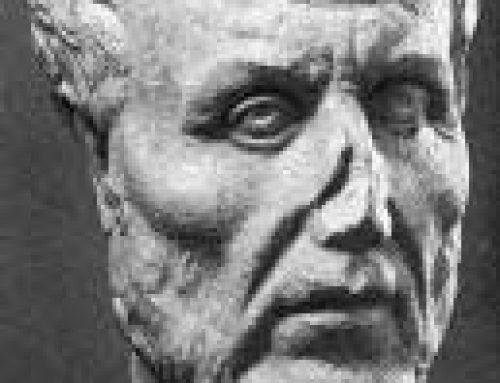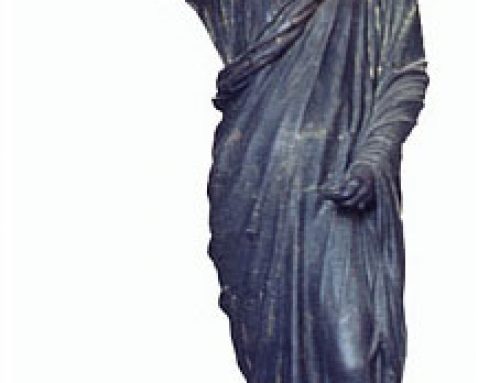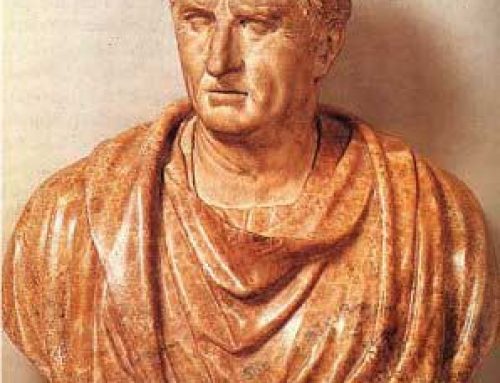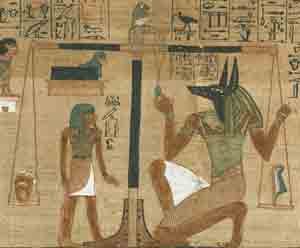
Weighing the souls of the dead
Philosophy means the love of wisdom. But what does that mean? It’s hard to separate philosophy from religion. And it’s also hard to draw a line between philosophy and science and mathematics. All of these are parts of people’s search to make order out of nature. They’re a way of looking for the victory of nomos over physis. It’s all people trying to make sense out of the world around them.
Some philosophers look at how people ought to behave. Is there such a thing as right and wrong? How can you tell what is right and what is wrong? Are right and wrong the same for all people? Or do some people have different rules? Who made these rules? Is happiness more important than doing right? We could call this ethics.
Some people who have been interested in ethics include:
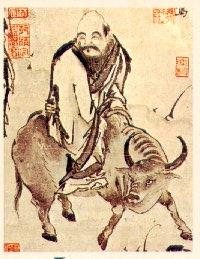
Later portrait of Lao Tzu
the Babylonians who made the first written laws, the Egyptians who discussed the weighing of souls after death, the Hindus who wrote about reincarnation, the Jews who told the stories of the Garden of Eden and the Covenant with God. Ethics philosphy also includes the Zoroastrians who divided the world into the Truth and the Lie. Then there’s the Buddhists who talked about how to escape reincarnation. But what about the Chinese philosopher Lao Tsu, who urged people to live in harmony with nature. Or Confucius, who thought people should do what was best for their community instead of for themselves?
Some Greek philosophers said that the best way to happiness is to be good. They wrote plays like Iphigeneia or the Libation Bearers. Romans like Cicero were more interested in self-control and the good of society. They also wrote systems of law. Then there was Jesus, who talked about Heaven and Hell, and Christians like Augustine, who saw us preparing the way for the City of God, or like Dante, or Abelard.
Other philosophers are more interested in how the world works. Is there such a thing as Fate? Do people make their own futures, or are their futures decided for them by the gods? Can you change your fate? Can you know the future? This is sometimes called the problem of predestination.
Some people who have been interested in predestination include:

The shepherd tells his story to Oedipus, while Jocasta listens in horror (now in the Getty Museum)
the Sumerians, who wondered why people have to die when they do, and the Babylonians, who studied the stars to learn the future, and invented astrology. The Jews also thought about this, with the book of Job in the Bible, and with the works of Ezra and Nehemiah. The Greeks confronted predestination in their system of oracles, and in plays like Oedipus Rex. And the Christians wondered why, if God could do anything, bad things happened to good people. They asked what it meant to be good, if God controlled all our actions.
A third group of philosophers were more interested in the natural world than they were in people. Where did the world come from?, they asked. Who made it? Why did they make it? Who is it for? How does it all hang together? Does everything make some kind of sense, or is it just a random bunch of stuff?
Some people who have been interested in the natural world include:

Ibn Sina’s medical text from the 1000s AD
the Egyptians, who developed a lot of mathematical equations and formulas for describing the world, and the Babylonians, who were great observers of space and the natural world, and had a detailed Creation story. The Jews had a related Creation story, but their own ideas about the Covenant. The Greeks(especially Aristotle and Theophrastus) were more interested in classification of the natural world into sensible categories. Then Romans like Lucretius also observed and explained, and the Gnostics and Neo-Platonists developed mathematical models of the natural world. Hundreds of years later, Islamic scholars like Ibn Sina and Ibn Rushd worked on these issues too. So did later Jewish scholars like Maimonides. And medieval Christians developed the idea that God made the world for mankind, in order to prepare men and women for Heaven, while Thomas Aquinas tried to make Aristotle agree with the Bible.
Learn by doing: what do you think right and wrong mean?
More about Early Modern and Enlightenment philosophy
Bibliography and further reading about ancient and medieval philosophy:
